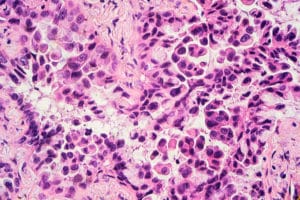New Data Challenge Current Standard in Treating EGFR+ Lung Cancer
Review of Commentary by Dr. Mark G. Kris, Memorial Sloan Kettering Cancer Center
Summary by Dr. Jennifer Cipriani
New Data Challenge Current Standard in Treating EGFR+ Lung Cancer
New data presented at the annual meeting of the American Society of Clinical Oncology 2019 (ASCO) may challenge the current standard in treating EGFR mutant lung cancer. According to Dr. Kris, three presentations in particular are of interest in challenging the current standard. The lung cancer community needs to be asking how do we best treat EGFR mutant lung cancers going forward? Should the standard continue to be single agent Osimertinib or can we do better?
First, data was presented from the phase III RELAY clinical trial showing that adding the angiogenesis inhibitor Ramucirumab to Erlotinib (Tarceva) as a front line treatment, increased progression free survival (PFS) by about 7 months. This is a substantial improvement over Erlotinib alone. We have known for a while that adding Bevacizumab (Avastin) to erlotinib significantly improved progression-free survival (PFS) compared with erlotinib alone in patients with EGFR-positive, advanced nonsquamous non–small cell lung cancer (NSCLC). So this concept of increasing PFS by combining additional treatment with TKI has been around for a while.
Second, an abstract demonstrating that adding chemotherapy to gefitinib improves PFS by about 8 months. Supplementing the EGFR–tyrosine kinase inhibitor (TKI) gefitinib with pemetrexed and carboplatin doubles progression-free survival (PFS) in patients with advanced, chemotherapy-naïve non-small-cell lung cancer (NSCLC) harboring activating EGFR mutations, according to phase III results. In addition, overall survival (OS) was also significantly improved with the combination of gefitinib and chemotherapy.
Together, this tells us that there are ways to improve upon the PFS and OS of Osimirtinib alone. Osimertinib has become the drug of choice for good reason, but we can do more. According to Dr. Kris, it is important to give your best drug first, and that drug is Osimertinib, but the data shows that adding ramucirumab and adding chemotherapy to Osimertinib can prolong time to progression. The lung cancer community just needs to be clever and forward thinking in it’s approach. Dr. Kris suggests not going back to using Erlotinib or Gefitinib as first line, but adding to our best drug Osimertinib instead. For instance, he mentions ongoing trials looking at giving chemotherapy to those patients with persistent EGFR mutations found in the tumoral DNA after a certain period of time treated with a TKI such as Osimertinib.
The next topic discussed by Dr. Kris was that EGFR+ acquired resistance. Dr. Adam Schoenfeld and colleagues at MSK presented an abstract at ACSO 2019 looking at acquired resistance in patients who received Osimertinib up front or at relapse. To Dr. Kris, and the rest of the lung cancer community, this abstract was eye opening. This was the first time that tissue samples were analyzed to look at the landscape of acquired resistance to Osimertinib, previous analyses involved using blood based data. Dr Schoenfeld et al identified patients with EGFR-mutant lung cancers who had comprehensive pre and post next-generation sequencing (NGS) performed on tumor tissue after developing acquired resistance to osimertinib. Unlike the findings from prior blood based testing, here they found that transformation to either small cell or squamous cell was the most common from of acquired resistance seen. This is very important information as this transformation is not detectable with blood based liquid biopsies. They also found only a small amount of on-target resistance after Osimertinib, only about 1 case out of 25, showed a 2nd site mutation, C797S. So unlike the prior experience with Erlotinib and Gefitinib, where second site EGFR mutations are the most common method of acquired resistance, this was not the case post Osimertinib. This tells us that at progression, NGS of tissue whenever possible, will give us the most thorough picture of what is happening. According to Dr. Kris, you are not going to detect these transformational changes, which could lead to a change in therapy, with blood based testing alone.
Clinical Takeways:
It is important to give your best drug first but also to be forward thinking. Data shows that adding ramucirumab or adding chemotherapy to Osimertinib can prolong PFS.
Oncologists need to do tissue based testing at progression when at all feasible. It is most likely that the cancer has transformed into squamous or small cell, not a second-site mutation. It is far from true that all questions related to treating EGFR mutant lung cancer have been answered.



